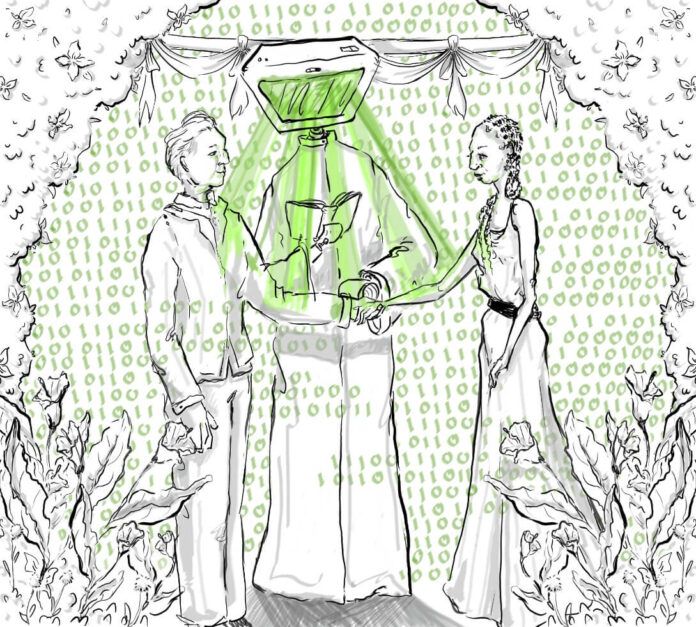Headlines such as “Forget Dating Apps — the ‘Marriage Pact’ Goes for the Long Haul” and “The Kids Are Making ‘Marriage Pacts’ to Distract Themselves From Doom” suggest the institutionalization of a new algorithm that arrived on campus the week before last that claims to revolutionize matchmaking between college students. No more than a few weeks after Fizz — which also started at Stanford — effectively created social turmoil on campuses, Marriage Pact had the audacity to drag us into a technological dystopia of emotions. Marketing messages posted by fellow Occidental students like “Better safe than sorry” and “THE BEST (and only) way,” made me feel that the survey was disgusting, alienating and objectifying.
Scrolling through Marriage Pact founder Liam McGregor’s posts on AI gaining traction in the matchmaking market only further validated my fear of AI intruding on one of the most intimate aspects of our lives. If all of our love lives are soon to be predetermined by a series of matrix operations, will we no longer explore and love new people? I could not engage in a matchmaking service like Marriage Pact’s survey without this deep moral discomfort.
That being said, I still took it. I also enthusiastically endorsed it to all of my friends and coworkers throughout the week. Like most people, I did it for the plot.
That’s why I was surprised to learn more about myself and what I was open to in relationships through the survey. Prompts like “Is it important to me that I make more money than my peers?,” “Everything will eventually be explained by science” and “I keep some ‘friends’ here at the university because they might be useful to me in the future” reminded me of differences that created irreparable rifts either between my parents or in my own relationships. As I answered these prompts, I slowly started to paint a picture of my current self mirrored onto a potential partner, and I imagined a conflict-free meeting where we knew we could deeply understand each other.
Self-reflection is one reason why third-party-mediated matches have been around for centuries. In a modern American setting, relationship coaches claim that the most useful thing they can do is give people permission to reflect on and say what they want in relationships, as the step is often neglected. In Shidduch dating, an Orthodox Jewish tradition, matchmaking evades apathy in traditional dating since you have to check back in with a third person. In South Asia, arranged marriages have long been used to maintain social order, give parents control (over family members) and preserve ancestral lineage. Though the specifics of Hindu and Muslim marriages differ, marriage is generally treated as an alliance between families rather than between two individuals, which is why matchmaking is so common. Matchmaking can be seen as an opportunity to build a solid foundation with someone in order to serve higher purposes — whether that be socioeconomic status or having dinner without fighting. Marriage Pact revitalizes traditional values of compatibility with the modern flair of mathematically engaging college students.
Yet the matchmaking services like Marriage Pact that we find ourselves with today are relying on fear and individualism among college students to function. They prey on the same neural pathways associated with imagining a perfect, ideal partner. Some of us may be quite familiar with limerence, attachment to someone based on a fabricated future with them. American college students are especially vulnerable to marketing that promises us the perfect person while ultra-focused on optimizing a career path and minimizing compromise and love. In other words, our hearts have grown smaller. Through the proliferation of digital parasocial friendships — as well as acclimating ourselves to being alone during the pandemic — we’ve discovered that we can survive in isolation, even if it’s demoralizing. We surrender to the barriers in discovering new people.
On the website, Marriage Pact states: “Listen, finding a life partner is probably not a priority right now. You hope things will manifest naturally — fine. [But] do you really want to look up from your cubicle when you’re forty to find yourself alone?”
This peer pressure can create a dangerous dependence on matchmaking apps and attachment to unreasonable expectations of compatibility. I would prefer the messaging to reflect the true value of Marriage Pact’s presence on campus — we engaged in conversations about how to love each other more authentically. When we can talk vulnerably about our values with our peers, it gives us hope that we can find someone who understands us on campus. This hope may be revolutionary for many, deterring them from engaging in sexual encounters they don’t really want or empowering them to search for love they deserve.
However, if people took the Marriage Pact as being a necessary precedent to marriage for everyone, it would be ridiculous. It implies a certainty about life and love that not only doesn’t exist but can make us feel entitled to our imagined futures with someone. Marriage Pact has lofty goals stated on their website — as if in 10 years it would be crazy that we settled for anything less — unsubstantiated by the fact that only three to four percent of marriage pacts end up in committed relationships.
I would be remiss not to mention that the week where conversations were abuzz with Marriage Pact, I made rearrangements with my past significant other, learned about the romantic desires and inhibitions of practically all my friends and met someone who wants to marry me (no, not the first-year who I am apparently 42.82 percent compatible with). If Marriage Pact was more transparent about the value of simply talking about Marriage Pact, they would have my full support.
There are too many side roads to follow in life; let’s stop attaching and grieving over what we hope or expect is the perfect destination. Life is about leaving space to love someone unexpectedly.
Contact Yanori Ferguson at yferguson@oxy.edu
![]()































